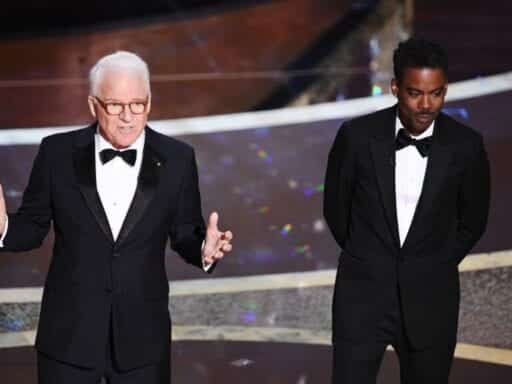Why the 2020 Oscars should have had a host.
For the second year in a row, the Oscars went hostless. But where the 2019 awards were sprightly and largely entertaining, the 2020 awards felt like they had absolutely no focus. As it became more and more clear that the Academy would award Best Picture to an international film for the first time, less-anxious viewers could instead focus on the curious choices in how the show was staged and produced.
The chief advantage of ditching an Oscars host in 2019 was that the show leapt quickly from item to item, rarely leaving viewers with too much time to get bored. The 2020 awards tried to do something similar with its hostless format, but the ceremony frequently felt like it was distracted by shiny objects off in its peripheral vision.
To make matters worse, the Oscars were a full 12 minutes longer than the 2019 awards — 215 minutes compared to 203 minutes. (For context, this year’s Oscars were longer than The Irishman.) And they did away with several elements, which theoretically should have made the show shorter — like the individual tributes to each and every Best Picture nominee — but the move did not succeed in that goal.
By the time the awards ended with the triumph of Parasite, the whole evening had dragged on and on, with a center-less feeling that was a bit headache-inducing.
The Oscars kept trying to have people fulfill the function of a host without having an actual host. It only added to the confusion.
/cdn.vox-cdn.com/uploads/chorus_asset/file/19709149/1205179876.jpg.jpg) Photo by Kevin Winter/Getty Images
Photo by Kevin Winter/Getty ImagesThe most obvious place in which the lack of a host could be felt was in the frequent moments when one person would appear on camera to introduce another person, who would then introduce yet another person. For instance, at one point, Anthony Ramos (star of the upcoming In the Heights and an alumnus of Hamilton) introduced his old pal Lin-Manuel Miranda, but Miranda was there to introduce something else entirely — a montage of great songs in movie history. And then that montage led in to a live performance by Eminem.
In and of itself, none of these things were bad. Ramos seems like a star in the making. Miranda is a star himself. Montages are an Oscar perennial. And Eminem’s “Lose Yourself” is an Oscar-winning song, and a terrific one to boot. But sandwiched altogether, it was impossible to figure out what was going on, or what we were supposed to be focusing on before the sequence moved on to something else.
During a traditional Oscars ceremony, a host would have offered a pithy joke about movie music, then Miranda would have appeared, and the evening would have proceeded as planned. This might seem not all that different materially to a viewer, but a host offers a continuity to the evening. They don’t have to say, “Hey, I’m Anthony Ramos!” and explain their whole situation — who they are and why they’re introducing this particular person. A host can just say, “Look, it’s global superstar Lin-Manuel Miranda!” It grounds the evening in a way these awards sorely needed.
Similarly, the 2020 awards kept trying to have segments built around the function of a host without actually having a host. When Steve Martin and Chris Rock came out near the top of the show to offer five minutes of comedy, it felt like gilding the lily after Janelle Monaé’s entertaining but odd opening musical number. “Musical number,” then “host-like segment that, nevertheless, is not actually a host segment,” then the first award is a whiplash-inducing sequence.
It’s entirely possible that the problem with this year’s award show wasn’t the lack of a host, but its inability to decide which elements of a traditional host to keep and which to jettison. For as impossible a gig hosting the Oscars is, the simple fact that someone like Jimmy Kimmel or Chris Rock or Ellen DeGeneres is there to smooth transitions and help out when, say, La La Land is erroneously named best picture over Moonlight, offers a constant place for the director of the awards show to cut to. It’s a home base in a show that sometimes badly needs a home base.
Television usually works best when a show has some sort of status quo to return to. That’s the case with awards shows, too. For as bad as so many Oscar hosts have been, they really do maintain the evening’s status quo. Even when you’re not sure why Joaquin Phoenix keeps winning awards for Joker, your host will be there to guide you through it.
A hostless Oscars could continue to work, but the structure of the show as-is all but begs for a host. In order to not have one yet again, the show’s producers will likely have to get more ruthless about which elements of the show are tossed and which are kept. The middle ground occupied by the 2020 awards — which tried to keep pretty much everything but the host, even adding back in elements that have been missing for years (like a live medley of the Original Score nominees) — ended up a bust.
In 2021, bring back the host. Maybe make it Alicia Keys. She always has such a great time hosting the Grammys.
Author: Emily Todd VanDerWerff
Read More



